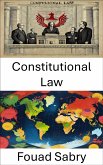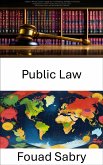Explore the essential world of "Judicial Review" in this pivotal "Political Science" volume. This book provides insights into judicial scrutiny, legal precedent, and power dynamics within constitutional frameworks.
1: Judicial Review: Foundational concept where courts assess laws' constitutionality to protect rights and legal principles.
2: Administrative Law: Examines court reviews of administrative decisions, balancing discretion and accountability.
3: Constitutional Law: Focuses on principles that guide constitutional law, interpreting national charters' impact on governance.
4: Separation of Powers: Analyzes how courts maintain balance among government branches, preventing overreach through checks.
5: Judicial Independence: Investigates the independence of judicial systems, vital for fair adjudication and protection from influence.
6: Nondelegation Doctrine: Assesses limits on legislative delegation to agencies, ensuring accountability and constitutional balance.
7: Separation of Powers in the U.S.: Details checks and balances in the U.S. system, illustrating key judicial decisions shaping its evolution.
8: Ultra Vires: Explores actions beyond legal authority, crucial for understanding court-enforced limits on powers.
9: Australian Constitutional Law: Insights into Australia's constitutional framework and its approach to judicial review and federalism.
10: Australian Legal System: Covers Australia's legal system's structure and function, emphasizing its constitutional intersection.
11: Separation of Powers in Australia: Contrasts Australia's power division with other jurisdictions, highlighting governance impacts.
12: Constitution of Singapore: Examines Singapore's constitutional foundations and the judiciary's role in upholding freedoms.
13: Law of France: Discovers France's legal traditions and its judiciary's role in constitutional interpretation.
14: Supreme Court: Investigates supreme courts' roles in setting precedents and ensuring judicial consistency.
15: Persona Designata: Explores personal designation concepts in legal contexts for specific roles or tasks.
16: Law of Azerbaijan: Insights into Azerbaijan's legal system and judiciary's role in safeguarding rights.
17: Separation of Powers in the UK: Examines the UK's governmental power dynamics shaped by historical and constitutional factors.
18: Separation of Powers in Singapore: Compares Singapore's division of powers with other jurisdictions, emphasizing governance impacts.
19: South African Administrative Law: Analyzes South Africa's administrative law, focusing on judicial review and constitutional accountability.
20: Parliamentary Sovereignty: Discusses parliamentary sovereignty principles and their implications for judicial review.
21: Primary and Secondary Legislation: Explores primary vs. secondary legislation distinctions for understanding law enactment and review.
1: Judicial Review: Foundational concept where courts assess laws' constitutionality to protect rights and legal principles.
2: Administrative Law: Examines court reviews of administrative decisions, balancing discretion and accountability.
3: Constitutional Law: Focuses on principles that guide constitutional law, interpreting national charters' impact on governance.
4: Separation of Powers: Analyzes how courts maintain balance among government branches, preventing overreach through checks.
5: Judicial Independence: Investigates the independence of judicial systems, vital for fair adjudication and protection from influence.
6: Nondelegation Doctrine: Assesses limits on legislative delegation to agencies, ensuring accountability and constitutional balance.
7: Separation of Powers in the U.S.: Details checks and balances in the U.S. system, illustrating key judicial decisions shaping its evolution.
8: Ultra Vires: Explores actions beyond legal authority, crucial for understanding court-enforced limits on powers.
9: Australian Constitutional Law: Insights into Australia's constitutional framework and its approach to judicial review and federalism.
10: Australian Legal System: Covers Australia's legal system's structure and function, emphasizing its constitutional intersection.
11: Separation of Powers in Australia: Contrasts Australia's power division with other jurisdictions, highlighting governance impacts.
12: Constitution of Singapore: Examines Singapore's constitutional foundations and the judiciary's role in upholding freedoms.
13: Law of France: Discovers France's legal traditions and its judiciary's role in constitutional interpretation.
14: Supreme Court: Investigates supreme courts' roles in setting precedents and ensuring judicial consistency.
15: Persona Designata: Explores personal designation concepts in legal contexts for specific roles or tasks.
16: Law of Azerbaijan: Insights into Azerbaijan's legal system and judiciary's role in safeguarding rights.
17: Separation of Powers in the UK: Examines the UK's governmental power dynamics shaped by historical and constitutional factors.
18: Separation of Powers in Singapore: Compares Singapore's division of powers with other jurisdictions, emphasizing governance impacts.
19: South African Administrative Law: Analyzes South Africa's administrative law, focusing on judicial review and constitutional accountability.
20: Parliamentary Sovereignty: Discusses parliamentary sovereignty principles and their implications for judicial review.
21: Primary and Secondary Legislation: Explores primary vs. secondary legislation distinctions for understanding law enactment and review.
Dieser Download kann aus rechtlichen Gründen nur mit Rechnungsadresse in A, B, BG, CY, CZ, D, DK, EW, E, FIN, F, GR, H, IRL, I, LT, L, LR, M, NL, PL, P, R, S, SLO, SK ausgeliefert werden.









